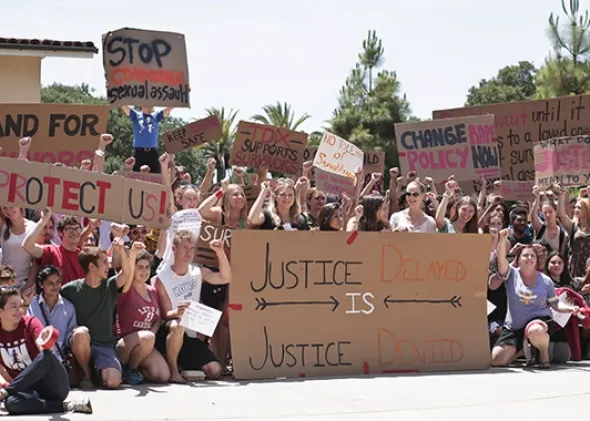Table of Contents
On Thursday June 5th, hundreds of students gathered in White Plaza to protest Stanford’s sexual assault response policies. The rally was spawned by an email from Leah Francis (Class ’14) that detailed her experience navigating Stanford’s Alternate Review Process (ARP). Francis called for “mandatory expulsion for individuals found guilty of sexual assault.” Francis’ experience is heartbreaking and unsettling. Rapists should be punished severely, and expulsion should definitely be seriously considered. However, for mandatory expulsion to be implemented, the ARP must be reformed to better protect the rights of the accused. In its current form, the ARP does not adequately ensure that defendants receive a fair hearing.
First, it is important to understand how the ARP Review board is selected. Five members, three of which are students and two of which are faculty, review and decide the case. Students should undoubtedly be the triers of fact in the case, because the concept of a jury of peers is an essential bedrock of our legal system. However, unlike the American judicial system, the trier of fact (the Review panel) also decides procedural and evidentiary questions. For example, the accused student is allowed to submit questions for the Review board to ask opposing witnesses. The Review panel has the power to decide whether the questions are germane to the case. The panel can refuse to ask the accused’s questions if they are “unduly incendiary” or if the information “has no bearing on a finding.” In a normal criminal trial, the judge rules on objections over questions and they are usually argued outside the presence of the jury. This prevents the jury from being prejudiced by improper questions. By merging the judge and jury, the ARP removes this critical protection. This protection is especially important given traditional methods of cross examination are removed from the ARP review process.
Second, the ARP uses a “preponderance of the evidence” as its standard of proof which it defines as “more likely than not” that an assault occurred. This standard is used in most civil cases in the United States. In a society that claims to prefer having the guilty walk free instead of the innocent wrongfully convicted, it is troubling that many advocate the harsh penalty of mandatory expulsion given the low legal standard of proof. Surviving a sexual assault is undoubtedly an extremely traumatizing experience, but mandatory expulsion coupled with a low standard of proof makes it too easy to ruin potentially innocent students’ future. Although Stanford’s judicial system is different from America’s and it can choose whichever standard it wishes to determine university punishments, it is important to consider that a preponderance of the evidence was considered too low an evidentiary standard in the United States because it does not do enough to protect the accused.
Before Stanford considers mandatory expulsion, it must raise the standard of proof to either “clear and convincing evidence” or “beyond a reasonable doubt.” The latter is the standard for most criminal cases in America and it is the highest level of proof. Since Stanford does not administer criminal penalties, a “clear and convincing evidence” standard that requires that “a party must prove that it is substantially more likely than not that it is true” will adequately protect the accused and still ensure justice. It strikes a better balance than the current “preponderance of the evidence” standard of proof.
Finally, the ARP fails to defend the accused against double jeopardy, which is being tried more than once for the same crime. The ARP gives the Vice Provost for Student Affairs the power to assess on appeal whether “Given the proper facts, criteria and procedures, was the Reviewers’ decision reasonable?” This offers broad latitude for a reversal of an acquittal, especially given the low standard of proof the accuser must meet. Like the standard of proof, Stanford is free to allow double jeopardy since it is separate from the American judicial system. Nevertheless, it is useful to understand why the Constitution protects Americans from double jeopardy.
The Fifth Amendment of the U.S. Constitution defends citizens against double jeopardy. The double jeopardy clause “guarantees that the state cannot ignore the outcome of a trial and start a new one just because it does not like the outcome of the first trial.” In era where universities are under intense pressure from the federal government to crack down on sexual assault, a protection from double jeopardy would be a powerful defense for accused students, yet the ARP does not offer this protection.
It is an outrage that Francis’ assailant was not punished more harshly. However, in our fury, we must not cast aside the rule of law and protections against the accused. If Stanford adopts a harsher penalty of mandatory expulsion, then it must strongly consider raising the standard of proof and prohibiting accusers from pursuing an appeal if the initial ARP decision process does not yield a favorable outcome.






